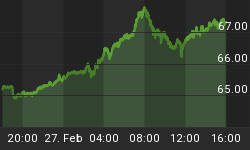This week a Chinese banking official commented that China held too many dollars in reserve and that perhaps the bank should seek to reduce its exposure. Not surprisingly, the dollar reacted by falling sharply against the euro and Swiss franc and even more against gold and silver. (The greenback gain a temporary reprieve later in the week following dovish comments from the ECB) Bond prices also fell, with yields rising to their highest levels since September of 2004. Of greater concern than the immediate market reaction are the long-term trends that such a policy shift in China will unleash. As the statement reveals not only China's predicament but also America's vulnerability, the remarks should amount to a wake-up call for Americans.
The obvious problem for China is that it can reduce its dollar exposure only by becoming a net seller of the currency. But when the buyer of last resort becomes a seller, who will be there to take the opposite side of the trade? The dilemma reminds me of the following joke about a fictitious egg futures trader:
A client called his broker inquiring about egg futures and is quoted a price of 25 cents per contract. Having a hunch about the egg market he buys 100 contracts. A week later he calls his broker to get a quote. Pleased to learn that the price of eggs has risen to 35 cents he decides to buy another 1,000 contracts. A few days later, eager to check on the progress of his investment, he is amazed to learn that the price has now risen to 50 cents per contract, twice the price he paid for his original 100 contracts. Sensing a trend, he steps it up, this time buying 100,000 contracts. The next day, ecstatic to learn that egg prices have now risen to 65 cents, he gets even more aggressive, buying 1,000,000 contracts. Sure enough, the following day the price of eggs rises to 95 cents, prompting him to order an additional million contracts. The day after that, as rising prices further validate his intuition, he buys yet another million contracts, this time paying $1.25.
The next day, with egg contracts trading at $1.75, he senses that the market has risen too far too fast, and places an order to sell 2,000,000 contracts. After a pregnant pause his broker replies, "Sell to whom, you're the egg man".
Ultimately the Bank of China, and other central banks throughout Asia for that matter, will come to their collective senses and attempt to unload their vast quantities of dollars. When that day finally arrives, the real life egg men in Asian will surely take it on their chins, but it will be Americans that literally have it all over their faces. After all, Asians will simply write off some horrible investments and perhaps lament their poor judgment. But once they bite the bullet, their standards of living will greatly improve, as a result of the enhanced purchasing power of their respective currencies. Americans on the other hand, will not be as fortunate, as an end to the free ride on the Asian gravy train will mean a sharp reduction in our standard of living.
Don't be caught with eggs you can not sell. Rather make sure to put yours in safe foreign baskets. Get the facts by download my free research report on preserving your purchasing power through foreign equities available at www.researchreportone.com and subscribe to my free, on-line investment newsletter at http://www.europac.net/newsletter/newsletter.asp. Better yet, buy some gold. Discover the best way to do so at www.goldyoucanfold.com.















